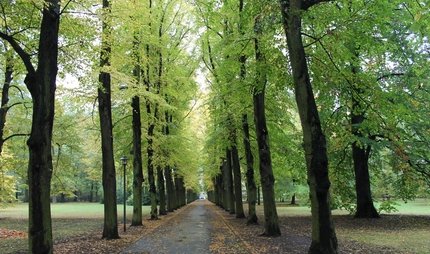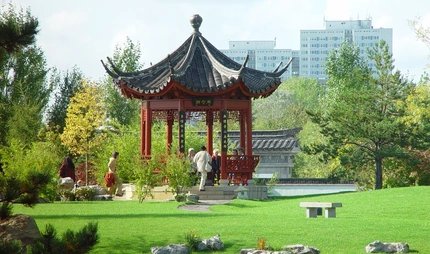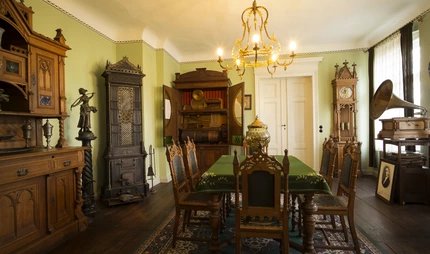
Schloss Biesdorf (Biesdorf Palace)
Monument, Garden Monument, Art Place
Surrounded by an idyllic and enchanted park, Schloss Biesdorf - freshly renovated since autumn 2016 and extended by one floor - offers art, culture, relaxation and culinary delights.
The new art institution is dedicated to the complex interplay of urban and natural landscapes and art in both urban and rural settings. Temporary exhibitions will showcase contemporary artists in dialogue with pieces from the former GDR. Regular artist talks, lectures, and concerts will accompany the exhibitions and reflect current discussions. It was an important venue for the art exhibition accompanying IGA Berlin 2017, the international horticultural exhibition.
Located on the periphery and yet only 20 minutes from the city center, the gallery in the Kunsthaus Schloss Biesdorf fokusses of the special urban situation of the Marzahn-Hellersdorf district, between single-family housing estates and prefabricated buildings. She presents and supports art projects with a focus on urban space. The castle maintains close cooperation with external curators and the Kunstarchiv Beeskow. The Kunstarchiv Beeskow preserves around 23,000 GDR art objects from public buildings prior to 1989 from parties, mass organizations and state organs of the GDR.
The gallery is the office of the Commission for Art in Public Space in the district of Marzahn-Hellersdorf and the point of contact for artists, architects, builders and anyone interested in the topic. She coordinates art competitions for district construction projects and advises private investors on the topic of public art. In addition, the gallery is a member of the KGB - the working group municipal galleries Berlin. The municipal galleries throughout Berlin show up to 200 exhibitions per year on around 3,500 square meters of exhibition space, in which about 1,000 artists are involved.
In his new role Biesdorf Palace offers its visitors a freely accessible exhibition on the history and architecture of the building, a café bistro, and a spacious lobby with a shop.
History of the building
Biesdorf Palace is a late-classical villa that is recognisable from afar thanks to its distinctive octagonal tower. The elegant country house was built in 1868 and is the oldest work by architect Heino Schmieden to survive in Berlin. Schmieden and his partner Martin Gropius later designed the Martin-Gropius-Bau, the Gewandhaus in Leipzig, and numerous hospitals. Biesdorf Palace was built in an Italianate villa style for the Baron von Rüxleben on the site of a former knightly manor. It was subsequently sold several times until it came into industrialist Werner von Siemens’ possession in 1887. Siemens is considered the founder of electrical engineering. His son, Wilhelm von Siemens, had the gardens expanded.
Beautiful park and unique architecture
The public park was designed by renowned landscape architect Alfred Brodersen in the English style with a pond, a historic ice house, winding paths, rolling lawns, and a valuable inventory of old deciduous trees and conifers. The gardens are home to various protected species of song birds and bats. The gardens also contain a tea pavilion and a reading garden. The villa’s screed cement façade dyed in a reddish tone is unique among historical buildings in Berlin.
Neglect, war, and reconstruction
In 1927, the 20-room villa came into the city’s possession. Later, the villa fell into a period of neglect, culminating in a 1945 fire which destroyed the entire top floor. In 2015-2016, the palace’s top floor was finally restored and its entire interior was completely renovated and equipped with modern technology. The historic façade and the outer area of the park are also being restored. Photographs from the late 19th century served the architects as a template. The interior contains offices, meeting rooms, workshops, storage rooms, exhibition and event spaces, as well as a barrier-free access and wheelchair-accessible toilets.
Accessibility
Access to Schloss Biesdorf is barrier-free and the toilets are wheelchair accessible.
Traffic
From the city centre, subway line 5 will take you to nearby Elsterwerdaer Platz or suburban train line 5 to the S-Bahn station Biesdorf in about 20 minutes.
Opening hours
| Monday | |
|---|---|
| Tuesday | |
| Wednesday | |
| Thursday | |
| Friday | |
| Saturday | |
| Sunday |

























